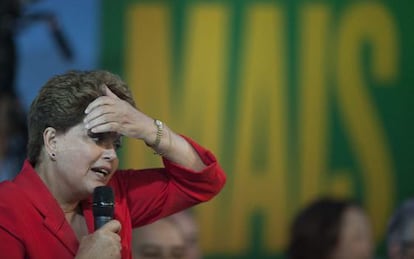Brazil’s electoral race hots up as political scandals surface
Election polls say candidates must win over 20 million undecided voters


Brazil’s electoral campaign is getting ready for its media storm. In two weeks, Brazilian TV stations will begin airing the parties’ campaign ads during a free and legally mandated time slot. Campaign season will begin in earnest on Monday as newscasts start to cover the candidates’ agendas. Then, 20 million undecided voters – out of an electorate of 142 million voters – will get to flirt with the presidential hopefuls who are already rehearsing their televised speeches. Until then, the contenders are focusing on political scandals.
News stories are exploding like firecrackers in the election committees. The first “victim” in the crossfire is Brazilian Social Democratic Party (PSDB) candidate Aécio Neves. Controversy is brewing over the use of public funds to build an airport six kilometers away from his family’s ranch in Cláudio (Minas Gerais, southeast Brazil). Neves said the facility, which was built while he was governor, responded to the community’s needs. Then he admitted that he had used the landing strip even though the airport had not yet received approval from the National Civil Aviation Agency.
Last weekend, the Brazilian magazine Veja wrote that Workers Party candidate and President Dilma Rousseff allegedly tampered with a congressional investigation regarding the purchase of the American oil refinery, Pasadena Refining System Inc. The publication said it had access to a video recording of a conversation between Petroleo Brasileiro SA (Petrobras) chief José Eduardo Barrocas, the company’s attorney Bruno Ferreira, and a third unidentified man. The individuals allegedly discussed a list of questions the investigative commission would ask company executives. The magazine interpreted the release of the questionnaire as a way to protect President Dilma Rousseff who was president of the board of directors at Petrobras when the deal was made in 2006. The acquisition of the refinery dealt heavy losses to the state-run oil company. According to Veja, the conversation took place on May 21, the day before former director of Petrobras’ international division Nestor Cerveró – a key person in the deal – talked to the commission.
As the race for Brazil’s 2014 presidential elections begins, the candidates are working hard to keep their supporters while attempting to convince millions of undecided voters. According to the polls, 20 million people have said they expect to cast a blank vote. But some of these prospective voters may change their minds, and those who have already decided which way they will vote may suddenly go in another direction as the race speeds up.
Claudio Couto, a political scientist from the Getúlio Vargas Foundation, said the PT and PSDB political scandals will have little impact on this election. “Both stories will get the same response. I doubt that Aécio Neves’ supporters will pull their votes over the airport and that Dilma Rousseff’s sympathizers will drop her because of a supposed negotiation over a congressional investigation questionnaire.”
This time, unlike in the past three presidential races, analysts expect a run-off after the first round of voting in October
Fátima Pacheco Jordão, a sociologist and director of the consulting firm, Fato, Pesquisa e Jornalismo says: “By now, the voter knows which way the election is going. He’s looking for the proposals behind all this smoke [in reference to the scandals], which will be more effective than the accusations.”
Couto adds that the congressional investigation scandal brings nothing new to the table because of the commission’s predictable process. “There is no surprise there. They do this for every investigation,” he says. Though this practice may surprise someone who does not follow politics, he says it does not seem unusual to those who understand how the legislature works. The commission is an important mechanism that has uncovered many cases like PT’s mensalão corruption scheme.
This controversy, however, will not make Rousseff’s job any easier. According to Datafolha, the president pulled in 36 percent of prospective voters. Neves received 20 percent and Brazilian Socialist Party (PSB) candidate Eduardo Campos fell in last place with eight percent of the votes. Still, 35 percent of Brazilians are dissatisfied with the president. Only 17 percent show discontent with Neves and 12 percent reject Eduardo Campos’ bid for the presidency. This time, unlike in the past three presidential races, analysts expect a run-off after the first round of voting in October.
Unlike her rivals, the president still has a debt to settle with voters. Inflation and the sluggish economy make Brazilians feel uncertain about the future. Besides, PT has worn itself out after 12 years in power. Neves and Campos, on the other hand, could not make any gains in the last few months. Although they are well known in their respective states – Neves as ex-governor and senator for Minas Gerais, and Campos as former governor of Pernambuco – they have little experience on the national stage. Their obscurity explains why they have not seen any great change in their numbers in the polls despite Rousseff’s high disapproval rating. “Campos and Neves are out of touch with a large portion of the electorate,” Couto says. “They have not been on the street, which is something they are doing now through television. Now, they can begin to campaign seriously.”
Political investigative journalist José Roberto de Toledo says these candidates have little time to win over voters this year because the nation was hosting the World Cup. The number of undecided voters and prospective blank votes usually drops, he says, as radio and TV ad campaigns began to air. The response to these messages will reveal more about the candidates’ chances.
Couto says Christian Social Party (PSC) candidate and evangelical pastor, Everaldo, must also push his way up in the polls. He will attract Pentecostal voters. According to the latest Datafolha survey, three percent of those expected to vote say they will cast their ballot for the pastor.
Raquel Seco contributed to this article.
Translation: Dyane Jean François
Tu suscripción se está usando en otro dispositivo
¿Quieres añadir otro usuario a tu suscripción?
Si continúas leyendo en este dispositivo, no se podrá leer en el otro.
FlechaTu suscripción se está usando en otro dispositivo y solo puedes acceder a EL PAÍS desde un dispositivo a la vez.
Si quieres compartir tu cuenta, cambia tu suscripción a la modalidad Premium, así podrás añadir otro usuario. Cada uno accederá con su propia cuenta de email, lo que os permitirá personalizar vuestra experiencia en EL PAÍS.
En el caso de no saber quién está usando tu cuenta, te recomendamos cambiar tu contraseña aquí.
Si decides continuar compartiendo tu cuenta, este mensaje se mostrará en tu dispositivo y en el de la otra persona que está usando tu cuenta de forma indefinida, afectando a tu experiencia de lectura. Puedes consultar aquí los términos y condiciones de la suscripción digital.








































